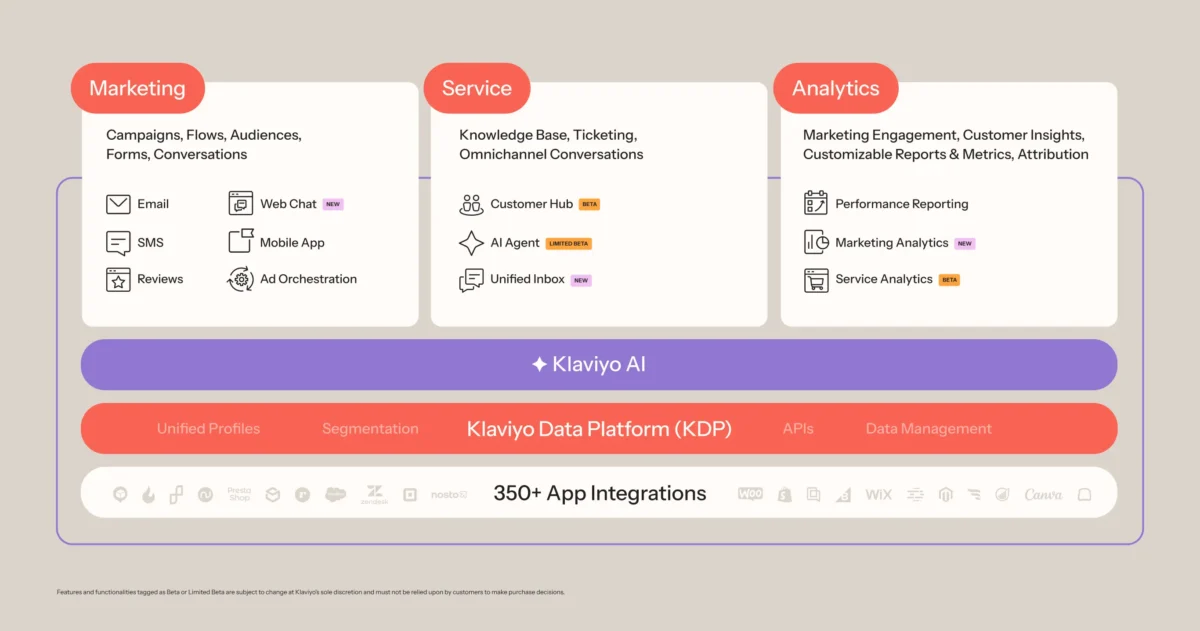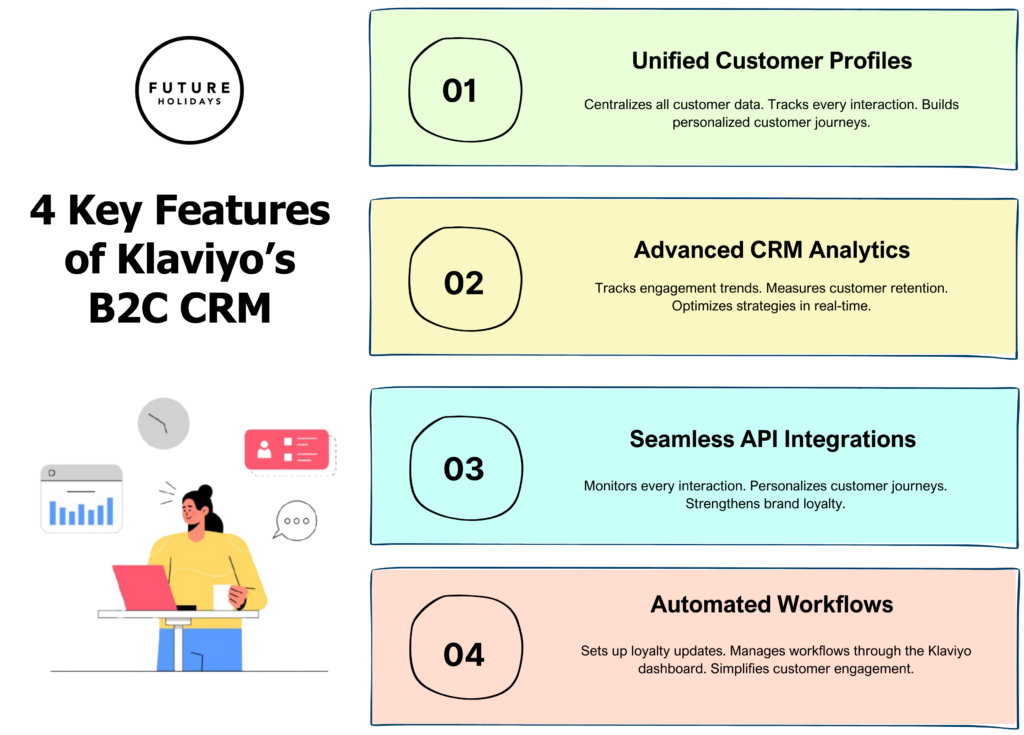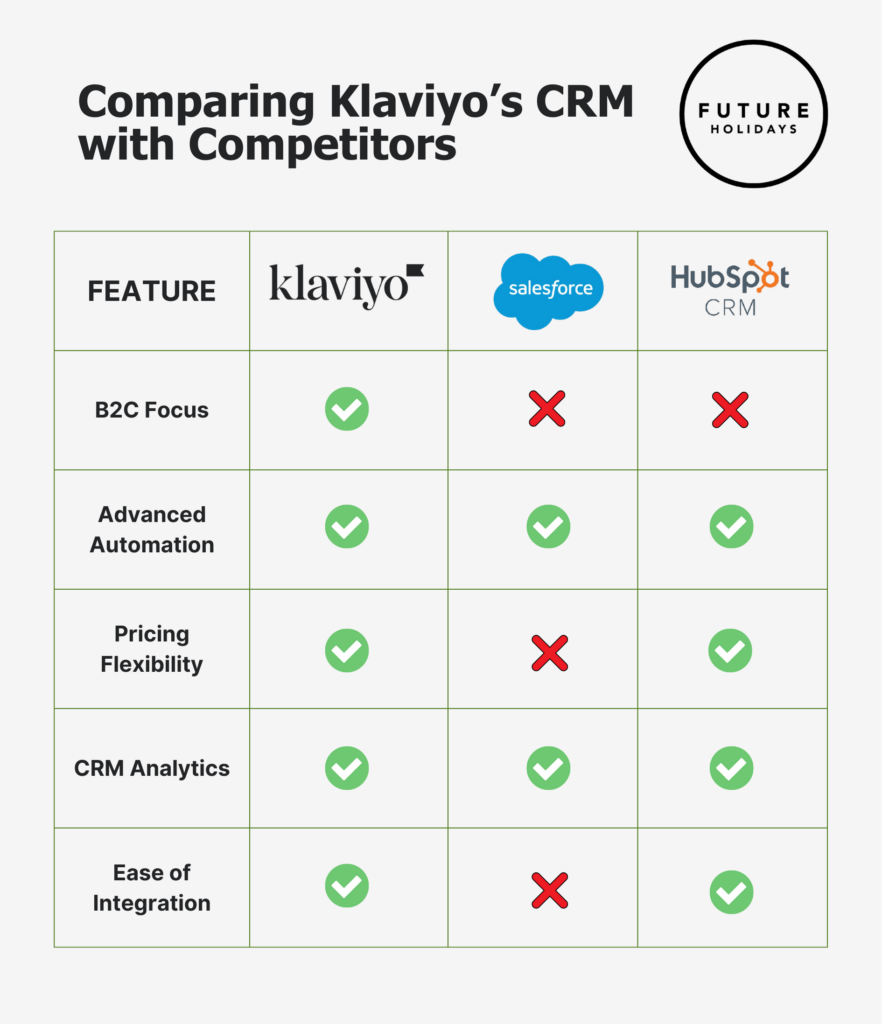Everything You Need to Know About Klaviyo’s B2C CRM

Customer relationships drive eCommerce growth. But building those connections has never been more challenging—competition is fierce, and personalization is now an expectation, not a bonus.
Klaviyo’s new B2C CRM is designed to help brands meet that challenge head-on. Built for businesses selling directly to consumers, it promises to simplify how brands manage customer data, automate engagement, and drive loyalty.
But does it live up to the hype? Here’s what the platform offers—and how users are reacting.
In this guide:
What is Klaviyo B2C CRM?
Key Features
What Are Users Saying?
Comparing Klaviyo’s CRM with Competitors
Is It Worth the Investment?
FAQs
Who Can Benefit from This?
Is This the Future of B2C CRM?
What is Klaviyo’s B2C CRM?
Klaviyo’s B2C CRM is a customer relationship management platform built specifically for direct-to-consumer (DTC) brands.
It helps businesses collect and centralize customer data, automate marketing workflows, and create personalized customer experiences at scale.
What Sets Klaviyo’s B2C CRM Apart?
- Built for B2C Brands: Unlike traditional CRMs that prioritize sales pipelines, Klaviyo focuses on meaningful, personalized customer engagement.
- Data-Driven Personalization: Real-time data powers targeted campaigns that enhance customer journeys and drive stronger relationships.
- Unified Experience with the Klaviyo Dashboard: A streamlined dashboard offers easy access to customer profiles, analytics, and automation tools for a seamless crm experience.
For businesses exploring options, this article serves as a detailed Klaviyo B2C CRM review, offering insights into whether this platform fits their needs.
Key Features of Klaviyo’s B2C CRM

1. Unified Customer Profiles for Seamless Personalization
Klaviyo makes it easy to get a complete picture of your customers by pulling together data from every interaction—whether it’s a website visit, an email open, or a purchase.
This holistic view empowers businesses to personalize every touchpoint in the customer journey, turning data into actionable insights that deepen engagement and build loyalty.
2. Actionable Insights with Advanced CRM Analytics
The platform’s advanced CRM analytics offer businesses valuable insights into customer behaviors and marketing effectiveness. Through the intuitive Klaviyo dashboard, users can monitor engagement trends, assess lifetime value, and optimize their campaigns based on real-time data.
With Klaviyo analytics, brands can:
- Identify top-performing campaigns
- Track customer retention rates
- Optimize engagement strategies using data-driven insights
3. Easy Integrations Powered by Klaviyo API
One of Klaviyo’s strengths is its ability to integrate with popular eCommerce platforms like Shopify, BigCommerce, and WooCommerce. With the Klaviyo API, brands can seamlessly synchronize customer data and automate workflows for a smoother marketing experience.
These integrations enable businesses to build personalized campaigns without needing additional third-party tools, simplifying customer management and data analysis.
4. Automated Workflows for Seamless Customer Service
Automated workflows are where Klaviyo truly shines. Brands can create triggers for personalized email sequences, loyalty program updates, or abandoned cart reminders—ensuring customers receive timely, relevant messages that feel thoughtful rather than automated.
Managing these workflows through the Klaviyo dashboard makes the entire process smooth and intuitive.
What Are Users Saying? Early Reactions and Sentiment
The buzz around Klaviyo’s CRM has been largely positive, though there are some areas where users see room for growth. Here’s what the early feedback reveals:
What users love:
- A clear focus on improving customer journeys through advanced personalization
- Seamless integrations using the Klaviyo API
- Powerful crm analytics that help brands refine their strategies
Common concerns:
- A learning curve when first navigating the tools on the Klaviyo dashboard
- Pricing challenges, particularly for smaller brands managing tight budgets
- A need for more case studies showcasing real-world applications
These early impressions reflect cautious optimism, with many brands eager to explore a Klaviyo B2C CRM demo to test the platform’s capabilities firsthand.
How Does Klaviyo Compare to Competitors?
Unlike Klaviyo competitors such as Salesforce and HubSpot—both designed primarily for B2B engagement—Klaviyo offers tools tailored for direct-to-consumer brands.

Pros and Cons for B2C-Focused Brands
Pros:
- Built specifically for DTC brands
- Comprehensive customer data management
- Robust CRM analytics for data-driven decisions
- Automated workflows for personalized engagement
Cons:
- Higher cost at larger contact list sizes
- Limited functionality for crm for service businesses
- Some learning curve for new users
When to Consider Alternatives: CRM for Service Businesses
While Klaviyo offers powerful features for B2C brands, businesses in service industries might benefit from more specialized platforms, such as Zoho or HubSpot, which offer stronger appointment scheduling and sales pipeline tracking functionalities.
Is Klaviyo’s B2C CRM Worth the Investment?
Klaviyo pricing is flexible, scaling with contact list size and email volume. However, for brands with large databases, costs can increase quickly.
Value assessment:
- Small businesses may find the price point steep unless they fully utilize advanced automation features.
- Medium to large eCommerce brands can justify the cost through improved personalization, enhanced CRM analytics, and better customer retention rates.
Before committing, businesses can explore a Klaviyo B2C CRM download for trial purposes to evaluate whether the platform aligns with their needs.
FAQs About Klaviyo’s B2C CRM
1. How does Klaviyo’s CRM improve customer relationships?
Klaviyo enables brands to personalize every interaction, fostering stronger customer relationships and driving loyalty by consolidating customer data into unified profiles.
2. What are the benefits of Klaviyo analytics?
Klaviyo analytics allows businesses to track customer engagement, measure campaign performance, and make data-driven decisions to optimize marketing strategies.
3. Can I try Klaviyo’s CRM before committing?
Yes, businesses can access a Klaviyo B2C CRM download for testing before committing to a full subscription. This trial allows brands to assess whether the platform suits their needs.
Should You Switch? Who Can Benefit from Klaviyo’s B2C CRM
Certain businesses will see more significant benefits from adopting Klaviyo’s CRM than others.
Best for:
- DTC eCommerce brands focused on enhancing customer journeys
- Brands using platforms like Shopify, WooCommerce, or BigCommerce
- Businesses prioritizing personalization, automation, and crm analytics
Not ideal for:
- Service-based businesses needing advanced scheduling and pipeline tracking
- Small startups without the resources to leverage advanced CRM features
Is This the Future of B2C CRM?
Klaviyo’s new CRM fills a major gap for DTC and eCommerce brands. With a clear focus on personalization, automation, and actionable insights, it offers tools that go beyond what traditional Klaviyo competitors provide.
If you’re already using Klaviyo’s marketing suite, making the leap to their CRM feels like a natural next step. For brands ready to leverage first-party data strategies and deepen customer engagement, Klaviyo’s CRM could be the game-changer you’ve been waiting for.

 Ryan Kodzik
Ryan Kodzik 
